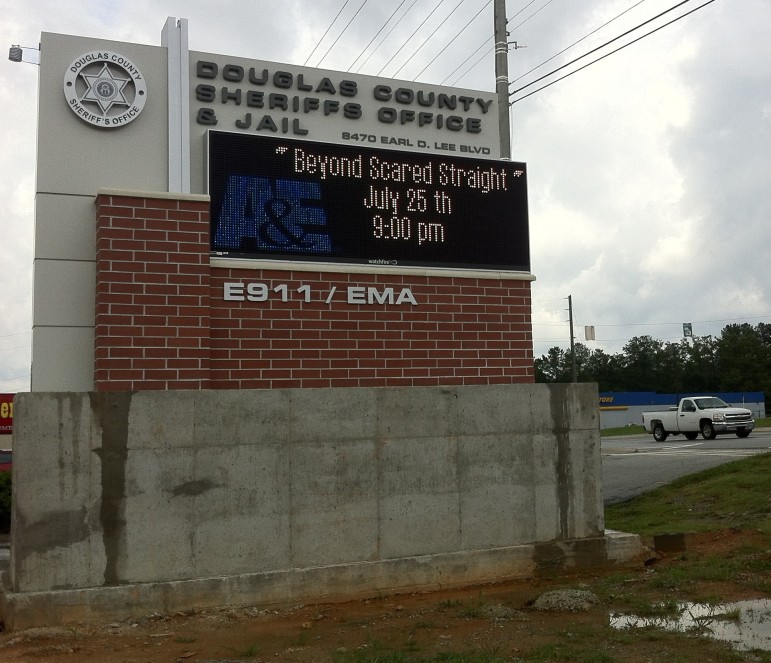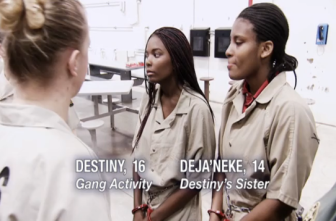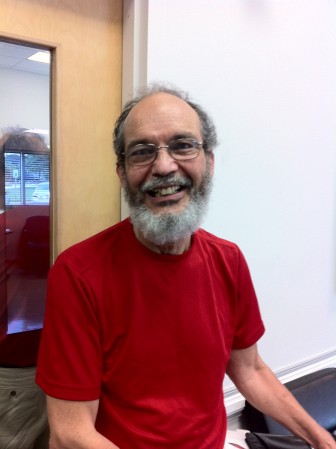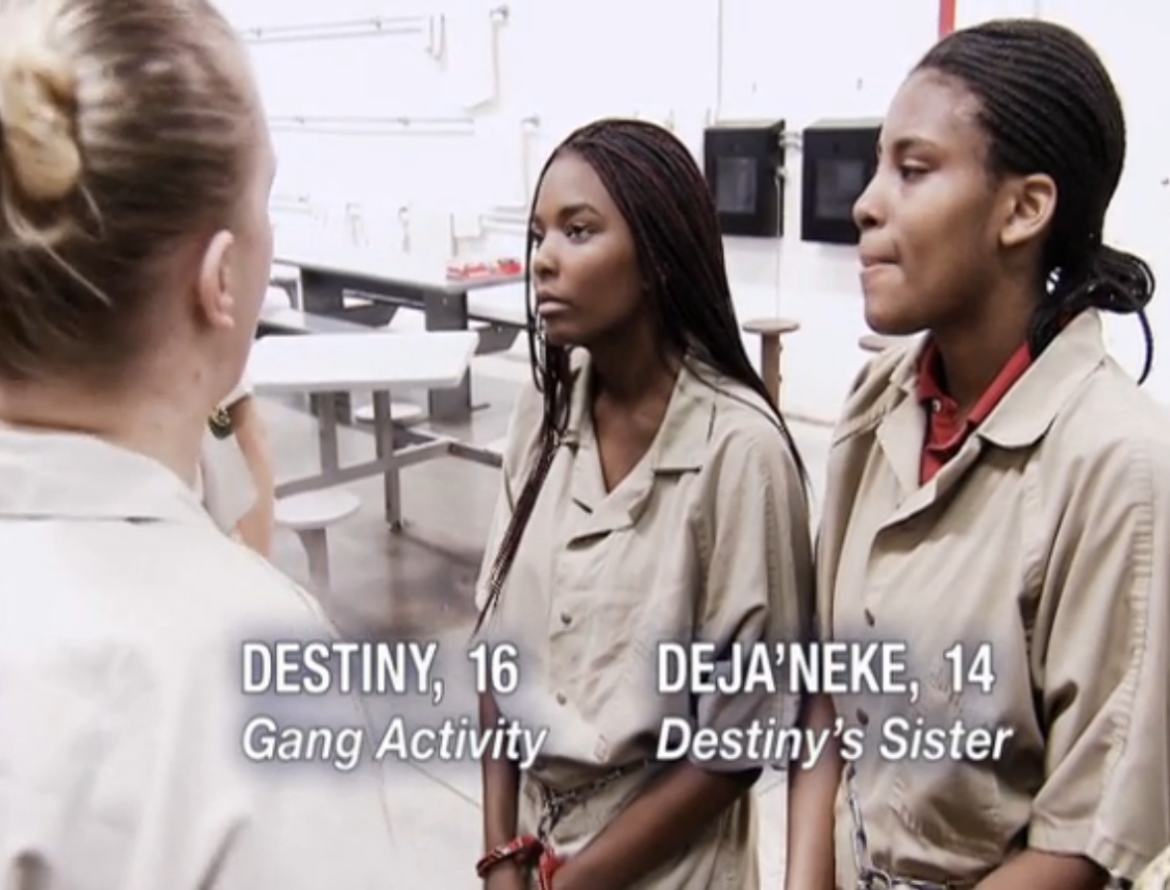
Maggie Lee / JJIE
The Douglas County Sheriff's Office sign advertises its upcoming appearance on the A&E program "Beyond Scared Straight."
This week, the fourth season of the A&E TV show “Beyond Scared Straight” follows two young sisters to the adult jail in Douglas County, Ga., where one inmate tells one of the sisters how she could beat her up “and make you not so pretty no more.”
Plenty of critics pan the show, saying it publicizes a discredited, harmful practice. Neither Georgia nor the feds will fund such jail tour programs, citing both evidence that it doesn’t work and the liabilities jails take on when they invite minors to meet with inmates.
“I still break the same law that sent me there,” said Pete Thomas, 27, of Atlanta, who for that reason spoke under a pseudonym. Ten years ago in central Florida’s Lake County, deputies pulled Thomas over and found him carrying less than 20 grams of marijuana. A scared straight-type visit to the county jail was part of his sentence in “Teen Court,” a diversionary program for young offenders.
“They tried to intimidate everyone in the group as much as possible, singled me out for having long hair, and the inmates acted crazed,” said Thomas, adding that he already knew people in that jail and that they were encouraged to lay it on thick.

"Beyond Scared Straight" / via A&E http://www.aetv.com/beyond-scared-straight/episode-guide/season-4/douglas-county-ga-40
Screenshot from the episode of "Beyond Scared Straight" filmed at the adult jail in Douglas County, Ga.
That illustrates some of the objections to jail awareness programs detailed by Nancy Gannon Hornberger, executive director at the Coalition of Juvenile Justice, a network of organizations dedicated to keeping children and youth out of court.
A kid’s response to such aggressive tactics, said Hornberger, is to “harden their bravado.”
And besides that, she said there’s another phenomenon that makes the bigger bully the winner: affiliation with the aggressor. “The group that is seen to have the greater power,” Hornberger said, “the [kids] will affiliate themselves with.”
She said there’s not a shred of evidence that scared straight-type jail tours work.
Anthony Petrosino agrees. He’s a researcher at WestEd, a research nonprofit and an author of an influential 2002 meta-analysis of scared straight studies.
“This program doesn’t have any positive effect and it may very well hurt the kids that are in the program,” he said. Petrosino and his team revisited the topic in 2012, trying to add more studies to their analysis. There were none to add and thus no new conclusions to make. Petrosino said that’s likely because scared straight is seen as a discredited program, so no one studies it anymore.
 Scared straight-type programs have no effect on deterring crime, according to his research, and they actually lead to more offending behavior.
Scared straight-type programs have no effect on deterring crime, according to his research, and they actually lead to more offending behavior.
“We’ve got a real serious ethical program here,” said Professor Del Elliott, the founding director of the Center for the Study and Prevention of Violence at the University of Colorado Boulder. “We’ve got a TV production that’s promoting a program which is doing harm to our children.”
Elliott called for the show to be taken off the air.
“No program works 100 percent, let’s be real about that,” said Elliott, but he pointed to dozens of programs that he said are proven to do good work, most especially two types of family therapy.
Previous episodes of “Beyond Scared Straight” do move beyond the eye-catching ads that show inmates berating youth. Episodes and programs vary but in some, inmates talk calmly to the kids; some are kept a certain distance from the visitors. Sometimes the kids wear prison jumpsuits and are locked in a cell, sometimes they’re not. Sometimes it shows local law enforcement following up with the kids and parents.
Petrosino said the data he saw was not extensive enough to tease out any nuances: if any particular exercises are any better or worse.
Thomas’ Lake County sentence did include plenty of other things besides the jail visit: a letter of apology to the arresting officer, more than 40 hours of community service and six months of drug counseling.
Ironically, he learned about more drugs, especially experimental hallucinogens, as part of the counseling and his assignment to research and write a paper on the uses, effects and history of marijuana.
“My long story short, I explored more drugs than I ever knew existed, possibly as a direct result of the experience,” said Thomas.

Maggie Lee / JJIE
Douglas County, Ga., has run its Making A Change Early, or MACE, jail awareness tours since 2011.
In Douglas County, kids are screened to see if they’re a good fit for their jail visit program, Making A Change Early, or MACE, said Chief Deputy Sam Copeland.
“It’s more for the person who’s on the edge,” he said, doing things like sneaking out at night, drinking or just having a bad attitude. The program serves youths aged 13 to 17 who are leaning toward delinquency, not a youth who has already been in custody.
Copeland said his inmates are probably hamming it up a little for the kids, but “what they’re telling them is the way it is … we try to make it as real as possible. You got to have a shock factor.
We want them to understand the lack of privacy, the lack of being able to do what you normally would do,” Copeland said.
After the jail tour, the kids see Magistrate Judge Barbara Caldwell. “They have to go before her and convince her that they should be released,” said Copeland.
MACE began only in 2011, so Copeland said they do not yet have a lot of statistical data, but “so far, when we go back to these parents we have phenomenal results back from the parents.”
Copeland added, to “take away a tool that is available, that might help a youth, I’ve always thought is ridiculous.”
Georgia’s Governor’s Office for Family and Children looks in on scared straight programs when they hear of them and explain their concerns as they relate to both federal and state law.
Jail awareness tours may be legally risky for counties: Georgia’s adult jails are not allowed to “receive” accused or adjudicated persons under the age of 17.
Housing juveniles in an adult facility in contravention of state law would expose a county to liabilities that may far outweigh short-term savings.
"What I would encourage folks to do is take a look at what research says," said Joe Vignati, justice division administrator at the Governor's Office for Children and Families.
"Focus your energies and support … your choices, your dollars, your votes on things that are shown to reduce crime," he continued.
"Does this [scared straight] reduce crime? No it doesn't," he concluded.

Maggie Lee / JJIE
Douglas County activist Free Polazzo said he wants his sheriff to stop doing scared straight-type tours, on the grounds they don’t teach kids how to deal with anger and violence.
Free Polazzo, a former teacher, and a current Douglas County activist, wants his sheriff to end MACE.
“I worry that they’re learning about how to do bad things and not get caught, and they also learn that grownups solve problems by ‘grounding’ people for years,” said Polazzo. He prefers that educators, faith groups, communities and families teach children.
He especially touts Help Increase the Peace, a Quaker-developed workshop where young people learn how to solve conflict nonviolently.
“We should not want our sheriff to be responsible or feel responsible for educating our children,” said Polazzo. “We elect sheriffs to be tough guys, but to expect a man who has to be that tough … he shouldn’t be expected to know all the ways of education.”
Beyond Scared Straight Producer Arnold Shapiro, on behalf of himself and his production team, declined to speak to JJIE.
As for Thomas, he said he no longer drives around with marijuana. He said he’s “calmed down” a little bit and doesn’t chase synthetic highs anymore.
“As far as what I recommend to law enforcement and families,” said Thomas, is “youth involvement. Idle hands are the devil’s tools. Rehabilitation is greater than incarceration. Less sugar, more books. Less reality TV, more Nova.”

I have a 9 year about be 10 year old april 6 he need be in this beyond scary program he bad in school never listen to me in his daddy we get phone call every day from the school because his behavior don’t listen in class he kick a student in hall way told the teacher f.you ……i need to sign him up asap thanks…